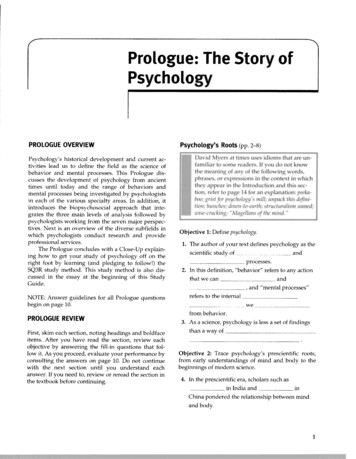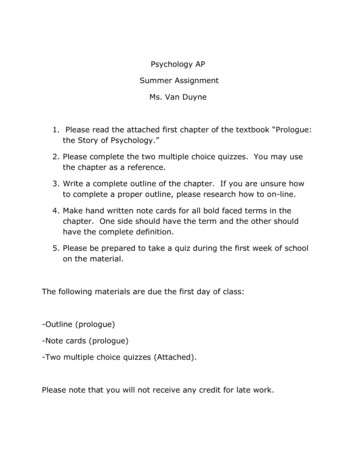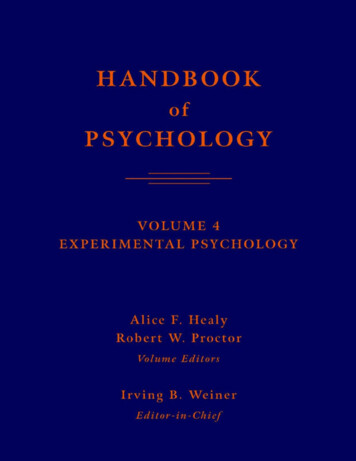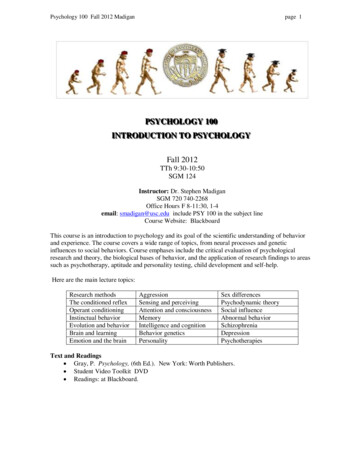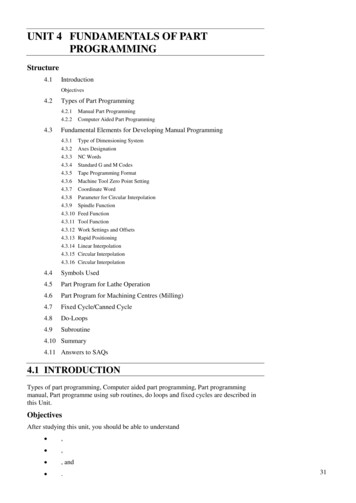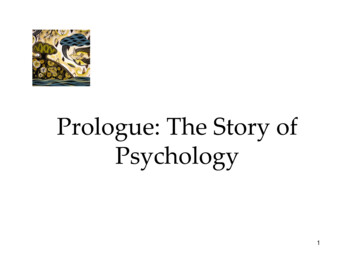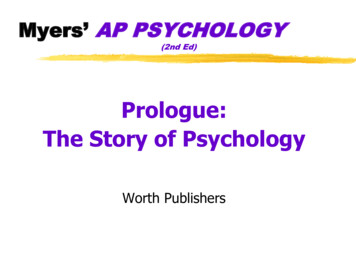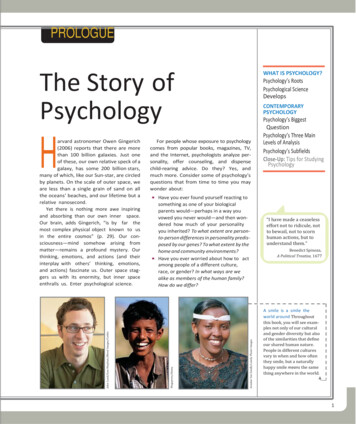
Transcription
HISHIVAJI UNIVERSITY, KOLHAPURCENTRE FOR DISTANCE EDUCATIONPsychologySemester-I & IIPaper-I & IIForKB. A. Part-IJ
Copyright Registrar,Shivaji University,Kolhapur. (Maharashtra)First Edition 2014Prescribed for B. A. Part-IAll rights reserved, No part of this work may be reproduced in any form by mimeography orany other means without permission in writing from the Shivaji University, Kolhapur (MS)Copies : 300Published by:Dr. D. V. MuleyRegistrar,Shivaji University,Kolhapur-416 004Printed by :Shri. B. P. PatilSuperintendent,Shivaji University Press,Kolhapur-416 004ISBN-978-81-8486-566-0lFurther information about the Centre for Distance Education & Shivaji University may beobtained from the University Office at Vidyanagar, Kolhapur-416 004, India.lThis material has been produced out of the Developmental Grant from UGC, DistanceEducation Bureau, New Delhi.(ii)
Centre for Distance EducationShivaji University, KolhapurnADVISORY COMMITTEE nProf. (Dr.) N. J. PawarVice-Chancellor,Shivaji University, KolhapurProf. (Dr.) M. M. SalunkheVice-Chancellor,Yashwantrao Chavan Maharashtra OpenUniversity, Nashi.Prof. (Dr.) K. S. RangappaHon. Vice-Chancellor,University of MysoreProf. P. PrakashPro. Vice-Chancellor,Indira Gandhi National Open University,New DelhiPrin. (Dr.) A. S. BhoitePro-Vice-Chancellor,Shivaji University, KolhapurProf. (Dr.) Cima YeoleGit Govind, Flat No. 2,1139 Sykes Extension,Kolhapur-416001Dr. A. P. GavaliDean, Faculty of Arts and Fine Arts,Shivaji University, KolhapurDr. J. S. PatilDean, Faculty of Social Sciences,Shivaji University, KolhapurDr. C. J. KhilareDean, Faculty of Science,Shivaji University, KolhapurDr. R. G. PhadatareDean, Faculty of Commerce,Shivaji University, KolhapurProf. (Dr.) A. B. RajageDirector, B.C.U.D.,Shivaji University, KolhapurProf. (Dr.) D. V. MuleyRegistrar,Shivaji University, KolhapurShri. M. A. KakadeController of Examinations,Shivaji University, KolhapurShri. V. T. Patil,Finance and Accounts Officer,Shivaji University, KolhapurProf. (Dr.) A. R. Bhosale(Member Secretary)Director, Centre for Distance Education,Shivaji University, Kolhapur.n B. O. S. MEMBERS OF PSYCHOLOGY nChairman- Dr. Ramesh Kondiba AdsulSmt. Mathubai Garware Kanya Mahavidyalaya, Khanbhag, SanglilDr. Bharat Adappa NaikHead, Dept. Psychology,Mahavir College, KolhapurlDr. Shrikant Bhanudas ChavanBabasaheb Chitale Mahavidyalaya,Bhilawadi, Tal. Palus, Dist. SanglilDr. Mahadev Ganapati JadhavKarmaveer Bhaurao Patil College,Urun-Islampur, Tal. Walawa, Dist. SanglilDr. Gaoutam S. GavaliProf. & Head Dept. of Applied Psychology,University of Mumbai, Mumbai-400098lDr. Arun Sambhaji PatilRajaram College, Kolhapur(iii)
Centre for Distance EducationShivaji University,Kolhapur.PsychologyB. A. Part-IWriting TeamAuthorsUnit No.Semester-I Paper-IDr. B. A. NaikMahavir Mahavidyalaya, Kolhapur.1, 4Dr. E. A. ShaikhY. C. College, Pachwad2Shri. A. S. GhasteKamala College, Kolhapur3Semester-II Paper-IIDr. P. B. DarureMahila Mahavidyalaya, Karad1Shri. P. R. PawarD. D. Shinde Sarkar College, Kolhapur.2Shri. S. K. Shitole3Mahavir Mahavidyalaya, KolhapurShri. D. V. Biraje4Kanya Mahavidyalaya, MirajnEditors nDr. Bharat A. NaikMahavir Mahavidyalaya, KolhapurShri. D. V. BirajeKanya Mahavidyalaya, MirajChief Editor :Dr. R. K. AdsulDr. Sarjerao A. Salunkhe,Chairman, BOS (Psychology)Professor of Sociology,Shivaji University, KolhapurDepartment of Sociology,Shivaji University, Kolhapur. (MS)(iv)
PrefaceShivaji University, Kolhapur has revised syllabus in optional PsychologyPaper-I & II for B. A. I class. The complementory book based on theprescribe syllabi "Introduction to Psychology" and General Psychology ishereby handed over to the students and teachers which gives us immensepleasure.'Introduction to Psychology' and 'General Psychology' these andseparates two parts of this book. Semester-I Paper-I is carrying 'Introductionto Psychology'. It includes four units. They are, Introduction to Psychology,Biological Bases of Behaviour, Sensation and Perception and Motivation.While 'General Psychology' is for Semester-II Paper-II includes four units,they are, Emotion, Learning and Memory, Intelligence and Personality.It is hoped this book will assists the students of Distance Education,teachers, regular mode students, and readers in general.As a part of Distance Education scheme conducted by Shivaji UniversityHon. Vice-Chancellor, Dr. N. J. Pawar, has inspired and guided for 'SelfInstructional Material' (SIM). We are greatful to the precious help of RegistrarDr. D. V. Muley, Director of College and University, Dr. A. B. Rajage, Deanof the Sociel Sciences Prin. Dr. J. S. Patil, Director of Centre for DistanceEducation Dr. A. R. Bhosale, Member of B.O.S. in Psychology, all authorsof this book and all other administrative staff of the centre.All the contributer-authors have written their units paying particularattention to communicate the subject to the students, teachers and redearsin general.We are also thankful to Dr. R. K. Adsul, Chairman, B.O.S. in Psychologyfor his Co-operation and guidance.Dr. B. A. NaikMahavir Mahavidyalaya, KolhapurEditor(v)
B. A. Part-ISIM IN PSYCHOLOGYINDEXUnit No.TopicPage No.Semester-I Paper-IIntroduction to Psychology1Introduction to Psychology12Biological Bases of Behaviour243Sensation and Perception584Motivation71Semester-II Paper-IIGeneral Psychology1Emotion912Learning and Memory1073Intelligence1294Personality153(vii)
Each Unit begins with the Objectives of the Section Objectives are directive and indicative of :1. what has been presented in the Unit and2. what is expected from you3. what you are expected to know pertaining to the specific Unitonce you have completed working on the Unit.The self check exercises with possible answers will help you tounderstand the Unit in the right perspective. Go through the possibleanswer only after you write your own answers. These exercises are notto be submitted to us for evaluation. They have been provided to youas Study Tools to help and keep you on the right track as you study theUnit.(viii)
B. A. Part - IINTRODUCTION TOPSYCHOLOGYPaper - ISemester-IUnit - 1 : Introduction to PsychologyUnit - 2 : Biological Bases of BehaviourUnit - 3 : Sensation and PerceptionUnit - 4 : Motivation1
2
Semester - I : Unit - 1Introduction to Psychology 1.0Objectives1.1Introduction1.2Subject Explanation1.2.1 Definition of Psychology (Modern)1.2.2 Goals of Psychology1.2.3 Perspectives of Psychology1.2.4 Psychology in Modern India1.2.5 Study Methods in Psychology(a) Naturalistic Observation(b) Experiment1.3Key words and meanings1.4Summary1.5Key to self study questions1.6Assignment for practice1.7Books for Reading1.0 ObjectivesAfter studying this unit you will be able to :1.Understand the nature and definition of Psychology.2.Know the goals of Psychology.3.Know various perspectives of Psychology.3
4.Understand the development of Psychology in modern India.5.Know the study methods in Psychology.1.1 IntroductionPsychology is a basic and applied science. Psychology as a science it dealswith human and animal behavior. Psychologists do study people, but they studyanimals too. What makes and people and animals tick is what goes on inside theirbodies and brains as well as what they do.In this unit we will discuss the definition (Modern) of psychology, goals ofpsychology, perspectives of psychology, psychology in modern India and variousstudy methods in psychology.1.2 Subject Explanation1.2.1 Definition of Psychology (Modern)‘Psychology’ word comes from Greek word ‘Psukhe’ and ‘logus’. ‘Psukhe’ meanssoul and ‘logus’ means reason or science. Today modern meaning of 'Psukhe' ismind and 'logus' is science. On this base earlier psychology was called as a scienceof soul. Today psychology is become a science as Physics, Botany, Chemistry,Biology etc. The subject matter of psychology is behavior. In Psychology now a dayshuman behavior and mental processes are studying scientifically.Modern definition of Psychology“Psychology is the scientific study of behavior and mental processes.’’In this definition behavior, mental processes and scientific concepts areimportant. Behavior includes all of our outward actions and reactions, such astalking, facial expressions and movements. Behaviour includes anything a person oranimal does that can be observed in some way. Mental processes refer to all theinternal, covert activity of our minds, such as thinking, feeling, learning, andremembering. The mental processes are called cognitive processes. Why scientific?To study behaviour and mental processes in both humans and animals, psychologistshave to observe them systematically and objectively. By using scientific methods,psychologists are able to find answers to questions about the nature of humanbehaviour and thought processes.4
In short modern definition of Psychology focuses on :1.Basically Psychology is a science, and2.Psychology studies behaviour and mental processes by using scientificmethods.Questions for Self-study - 1M. C. Q.1.Psychology is basic and science.(a) natural2.(b) animals(c) insects(d) pets.(b) Russian(c) French(d) Greek.Today the subject matter of psychology is .(a) invisible5.(d) scientific.Psychology word comes from . word psukhe and logus.(a) English4.(c) appliedPsychologists do study people, but they study . too.(a) birds3.(b) theoretical(b) nonscientific (c) behaviour(d) soul.The mental processes are called . processes.(a) Cognitive(b) Scientific(c) Physiological (d) Social.1.2.2 Goals of PsychologyEvery Science has its goals. Psychology is also a science. It has also somegrals In physics, the goals are concerned with how the physical word works. Inastronomy the goals are concerned with to chart the universe and understand bothhow it come to be and what it is becoming. In Psychology, there are four goals. Theaim of these goals is to uncovering the mysteries of human and animal behaviour.The goals of psychology as follows :1.Description / To describe : What is happening?First goal of psychology is to understanding anything is to give is a name orlabel. Description involves observing a behaviour and noting everything about it :what is happening? where it happens? to whom it happens? and under what5
circumstances it seems to happen? For example, a teacher might notice that ayoung girl in his second-grade classroom is behaving oddly. She is not doing herhomework, her grades (works) are slipping badly, and she seems to have verynegative attitude toward school and study.Through this description a girl we will get a picture of that girl’s behaviour. Whatshe is doing. The description of what she is doing gives a starting place for the nextgoal : Why is she doing it ? The goal of the description provides the observationsof behaviour.2.Explanation : Why is it happening ?To find out why the girl student is doing all these things in school. The teacherof that school should ask the school counselor for counseling. Her parents might beasked to take her to a pediatrician to make sure that there is no any physical illness.In other words all are trying to explain girls behaviour. Finding explanation for behaviouris a important step in the process of forming theories of behaviour. A theory is ageneral explanation of set of observations of facts. The goal of the explanation willhelps to Psychologists to build the theory.Through this explanation it seems that this girl student is having dyslexia.Dyslexia means an inability to read at expected levels for a particular age and degreeof intelligence. Then the next goal is prediction.3.Prediction : When will happen again ?Prediction means determining what will happen in the future. In the aboveexample, the school counselor or psychologists would predict that this girl studentwill probably continue to do poorly in her schoolwork and a may never be able toreach her full learning potential.Predicting behaviour is important; it enables psychologists to help peopleanticipate situations and learn how to express their feeling in manageable reasonableways. But description and explanation are per requisites to predicting behaviour andhelping people manage it.4.Control : How can it be changed ?Control, change, manage or the modification is fourth goal of psychology. Butthis goal has been some what controversial in the past. Some people hear the word6
control and think brainwashing, but that is not the focus of this goal. The goal is tochange a particular behaviour from an undesirable one to a desirable one. Suchefforts also include attempts at improving the quality of life.In the above example of the girl student, there are some learning strategies thatcan be used to help a child who has dyslexia (learning Disorder) improving readingskills (Aylward et al., 2003; Shaywitz, 1996). Counselors, Psychologists,Psychotherapists and educators would work together to search a training strategywhich works best for this dyslexic girl.In short the goals of Psychology are to describe, the basic components ofbehaviour to explain them, to predict them, and potentially to control or managethem. Not all psychologists or counselors will try to meet all four goals. In somecases, the main focus might be on description and prediction as it would be for apersonality theorist who wants to know what people are like and what they might doin certain situations. They use description and prediction. Some psychologists areinterested in description and explanations for observed behaviour. But experimentalpsychologists who design research to find explanations for observed behaviour. Inthis situation experimental Psychologists uses the description. Therapists, of course,would be more interested in control or modification. Although the other three goalswould be important in getting to that goal.These goals of Psychology have not really changed since the psychology’sbeginnings, but the methods of achieving them certainly have changed.Questions for self-study - 2M. C. Q.1.What is happening? means . .(a) explanation2.(d) control.(b) description(c) explanation(d) control.When will happen again? means .(a) description4.(c) descriptionWhy is it happening? means .(a) prediction3.(b) prediction(b) explanation(c) control(d) prediction.How can it be changed ? means . .(a) control(b) prediction(c) explanation(d) description.7
5.Therapist would be more interested in or modification.(a) explanation(b) description(c) control(d) prediction.1.2.3 Perspectives or approaches of Psychology :Psychologists subscribe to many different perspectives or approaches in tryingto analyze human behaviour. These perspectives have been developed over timeacross the history of psychology and serve to orient researchers providing themwith a frame of reference. A specific perspective to the study of behaviour is calledschool of psychological thought. In psychology we study human behaviour and mentalprocesses. All perspectives are trying to explain human behaviour and mentalprocesses. But no one perspective perfect to explain the causes of behaviour andmental processes. Through these effects psychologists have developed variousperspectives in psychology. The various perspectives of psychology as follows :1. Psychodynamic perspective : Psychodynamic is the theory and therapybased on the work of Sigmund Freud.Dr. Sigmund Freud (1856-1939) has developed thepsychodynamic perspective. According to this perspectivehuman behaviour is motivated by various internal energiesand internal conflicts. Which are not easily accessible. Weare not aware of all wishes, thoughts, feelings, conflicts andurges and yet they may directly influence our behaviour invarious ways. These are called unconscious processes.Dr.Sigmund FreudUnconscious mind concept has coined by Freud. Sexualdissatisfaction, unfulfilled motives, conflicts, wishes and destructive thoughts aresuppressed in our unconscious mind. But these things are not visible.Psychoanalytic theory assumes that maladjustment is a consequence of anxietyresulting from unresolved conflicts and forces of which a person may be unaware.Freud emphasized the idea that childhood experiences influence future adult behaviourand that sexual energy fuels day-to-day behaviour.2. Behavioral Perspective : American Psychologist J. B Watson (1878-1958)challenged the functionalism as well as psychoanalysis, with his own science ofbehaviour, which is called behaviourism. Behaviourism is the science of behaviour8
J. B. Watsonthat focuses on observable behaviour only. Behaviouralperspective rejects the mind or mental processes andemphasis only on observable and measurable behaviour.Thats why J. B. Watson is called the father of behaviourism.According to Watson for understanding the behaviour it isnecessary to study the environment is which behaviouroccurs. Our all behaviour depends on environment. Watsonbelieved that if we control the environment, we can modify orchange the behaviour and bring expected changes inbehaviour.Watson based a lot of his ideas on the work of Russian physiologist IvanPavlov. Pavlov, in his experimental work with dogs, had shown that a reflex such assalivation, which is normally produced by actually having food in one’s mouth, couldbe caused to occurs in response to a totally new and formerlyunrelated stimulus, such as sound of a bell. He would ringthe bell, give the dogs food, and they would salivare. Afterseveral repetions, the dog would salivare to the bell beforethe food was presented a learned reflexive response. Thisprocess was called conditioning.Watson believed that every human behaviour is learned.After Watson B. F. Skinner (1904-1994) systematicallyIvan Pavlovexpended the behaviorism. He conducted served experimentson rat and Pigeons, and developed operant conditioning. Inoperant conditioning describes learning in which a voluntaryresponse in strengthened or weakned, depending on itspositive or negative consequences. For example a child whocries and rewarded by setting her his mothers attention willcry again in the future. Behavioral perspective focuses onhow observable responses are learned, modified, andforgotten. It usually focuses on current behaviour and how itB. F. Skinneris acquired or modified rather than inherited characteristicsor early childhood experiences. Behavioral perspective is still a major and importantperspective in psychology today. It has also influenced the development of otherperspectives, such as cognitive psychology.9
Abraham Maslow3. Humanistic perspective : This is new perspectivein perspective in psychology which is know as third force inPsychology. The perspective is response to psychodynamicperspective and behavioral perspective. In the early to mid1990s, psychodynamic perspective and behavioralperspective were dominant in psychology; Behaviorism wasseen as a very ‘mechanical’ theory. In this theory stimulusgoes in, response comes out, and what happens in the middleis of no interest. The environment determines behaviour andthe individual has no control on it.Humanistic perspectives focus is on people’s ability todirect their own lives. Humanist held the view that peoplehave “free will”, the freedom to choose their own destiny.Abraham Maslow (1908-1970) and Carl Roger (1902-1987)are the founders of this perspective. They emphasized theCarl Rogerhuman potential, the ability of each person to become thebest person he or she could be. They believed that studying animals in laboratoriescould not lead a better understanding of this human potential for ‘self actualization;’as Maslow called it – achieving one’s full potential or actual self. In psychotherapyhumanistic perspective is still very influential and popular.4. Biopsychological perspective : Another new emerging perspective inpsychology is biological perspective. Biological perspective is the study of the biologicalbases of behaviour and mental processes. In the biological perspective, human andanimal behaviour is direct result of events in the body. Hormones, brain chemicals,tumors and diseases are some of the biological causes of behaviour and mentalevents. For example, due to biological cause schizophrenia occurs.5. Cognitive perspective : This is a major force in Psychology which isemerged in 1960s. Cognitive psychology focuses on how people think, remember,store, and use information. Earlier Gestalt psychologists were supported to study ofmental processes of learning. So, cognitive psychology was not a new perspective.The development of computers, the work of Piaget with children, Chomsky’s analysisof Skinner’s views of language, and discoveries in biological psychology stimulated10
an interest in studying the processes of thought. Cognitive psychology focuses onmemory, intelligence, perception, thought processes, problem solving, language andlearning.6. Sociocultural perspective : This perspective focuses on the relationshipbetween social behaviour and culture. This is another modern perspective inpsychology. Sociocultural perspective is a combination of social psychology andcultural psychology. Social psychology is the study of groups, social roles, socialactions, and relationships. Cultural psychology is the study of cultural norms, valuesand expectations.The sociocultural perspective reminds people that how they and other’s behaveis influenced not only by the particular culture in which they live. For example in aclassic study Darley and Latane (1968) found that the presence of other peopleactually lessened the chances that a person in trouble would receive help. This termis called “diffusion of responsility.’’ Diffusion of responsibility is a tendancy in whichpeople feel that someone else is responsible for taking action when others arepresent. Can we apply this conclusion for other culture? sociocultural perspectivestries to answer this question.7. Evolutionary Perspective : This perspective focuses on the biologicalbases for universal mental characteristics that all humans share. This perspectiveexplains general mental strategies and traits. Such as why we lie, how attractivenessinfluences mate selection, why fear of snakes is so common, and why people likemusic and dancing among many others.Charles Darwin (1809-1882) first suggested evolutionary theory. In thisperspective, the mind is seen as a set of information-processing machines, designedby the same process of natural selection. Which allow human beings to solve theproblems we faced in the early days of human evolution the problems of the earlyhunters and gatherers. Evolutionary psychologists would view the human behaviourof not eating bitter taste substances as an adapting behaviour that evolved as earlyhumans came into contact with such bitter plants. Those who ate the bitter plantswould die, while those who spit them out survived to pass their genes on to theiroffspring, who would pass the genes on to their offspring, and so on, until after a longperiod there is an entire population of humans that naturally avoid bitter-tastingsubstances.11
Questions for Self-Study – 3M. C. Q.1.All perspectives of psychology are trying to . behaviour and mentalprocesses.(a) explain2.3.(a) behavioral(c) humanistic(b) psychodynamic(d) social.7.(b) Freud(c) Jung(d) Adler. is called the father of behaviourism.(b) Maslow(c) Watson(d) Pavlov.After Watson . extended the behaviourism.(a) Pavlov6.(d) predict.Unconscious mind concept has coined by . .(a) Freud5.(c) controlDr. Sigmund Freud developed . perspective.(a) Maslow4.(b) extend(b) Skinner(c) Rogers(d) Freud.‘Free Will’ is related with perspective.(a) Cognitive(c) Humanistic(b) Behavioural(d) Sociocultural. Perspective was a major force in psychology which is emergedin 1960s.(a) Humanistic8.(b) Evolutionary (c) Cognitive(d) Behaviouristic. perspective is combination of social psychology and culturalpsychology.(a) Humanistic9.(b) Cognitive(c) Sociocultural (d) Evolutionary.Darley and Latane coined the concept . .(a) Free will(c) unconscious mind(b) Diffusion of responsibility(d) Conscious mind.10. . first suggested evolutionary theory.(a) Maslow(b) Darwin(c) Rogers(d) Watson.12
1.2.4 Psychology in Modern IndiaUniversity of Calcutta introduced psychology first in modern India. Sir BrajendraNath Seal drew a first syllabus for experimental psychology in 1905. In 1916 Dr. N.N. Sengupta started first psychology department in India. He was its first chairman.Professor Girindra Shekhar Bose succeeded Sengupta. He was closely associatedwith Dr. Sigmund Freud and founded the Indian psychiatric society in 1922, whichstarted publishing its journal ‘Samiksha’ in 1947. Professor Girindra Shekhar Bosewas awarded the first Ph.D in psychology for his work on repression. This departmentstarted an applied psychology wing in 1938. Patna and Mysore universities alsostarted courses in psychology. Dr. M. V. Gopalswami who trained at London Universitywith Spearman the English psychologist, headed the department at Mysore. H. P.Maitri started the Institute of psychological research and services at Patna University.Professor S. M. Mohsin provided leadership at Patna and a large number ofpsychologists were trained.In India early focus of Psychological research was in the area of experimentalpsychology, psychoanalysis, and psychological testing. Many new departments werestarted in 1960s. During this time various applied areas of psychology received boostin institutes of management, teacher training, defense, child development andcommunication studies.In 1925 Indian Psychological Association (IPA) was founded and launched IndianJournal of Psychology (IJP). Lumbini Park Mental Hospital (LPMH) was founded atCalcutta in 1940. Psychology wing of Defense Research was established in 1945,which became part of the Defense Science Organization of India (DSOI). In 1962National Institute of Mental Health and Neurosciences (NIMHANS) was opened atBangalore. Indian Academy of Applied Psychology (IAAP) was established in 1962.The major event in psychology was establishment of a hospital for mental diseasesat Ranchi. In 1968 India Association of Clinical Psychologists (IACP) was foundedand in 1989 and the National Academy of Psychology (NAOP) was founded as a newprofessional body.Today, psychology has greatly expanded it’s scope. Now psychology is doingnot only study of cognitive processes, procedural justice, personality processes,motivational and emotional processes and human development. But also poverty,prejudice and discrimination, socialization and morality, healing, health and wellbeing.13
Question for Self-Study – 4M. C. Q.1.University of . introduced psychology first in modern India.(a) Patna2.3.4.5.6.(c) Calcutta(d) Delhi. . drew a first syllabus for experimental psychology in 1905.(a) H. P. Maitri(c) Sir Brajendra Nath Seal(b) Dr. N. N. Sengupta(d) Dr. M. V. Gopalswami. . started first psychology department in India in 1916.(a) Dr. N. N,. Sengupta(c) H. P. Maitri(b) Dr. M. V. Gopalswami(d) Professor Girindra Shekhar BoseIndian psychiatric society stated its Journal . in 1947.(a) Manus Samiksha(c) Mental health(b) Samiksha(d) Depression. . was awarded the first Ph. D in psychology for his work onrepression.(a) Dr. N. N. Sengupta(c) Sir Brajendra Nath Seal(b) Dr. M. V. Gopalswami(d) Professor Girindra Shekar Bose.Lumbini Park Mental Hosp
'Introduction to Psychology' and 'General Psychology' these and separates two parts of this book. Semester-I Paper-I is carrying 'Introduction to Psychology'. It includes four unit s. They are, Introduction to Psychology
